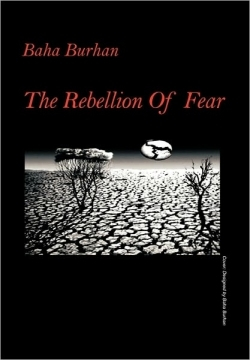The Rebellion of Fear
This collection of poems celebrates the epigrammatic statement, sometimes intended to ironically amuse, but largely intended to thoughtfully provoke. Burhan uses very short poems, usually three lines or less, to muse on a variety of ideas from the nature of man to the nature of fear, which he thinks are inextricably entwined.
Burhan, a Syrian writer, earned a BA in English from Damascus University. The author of the novel Daring Silence, he currently serves as headmaster of Al-khaled Institute for Languages in Al-zabadani, Syria. In an introductory note detailing his motivation for writing the book, Burhan explains that humankind fears the truth, not only discovering it, but understanding it. This creates hesitation and keeps people from living fully realized lives. This kind of explanatory note, in many ways, negates the book itself . The poems themselves generally lack figurative language and image. Instead, they rely on the author’s brand of wisdom to propel them. Explaining that wisdom from the very beginning makes the reading journey repetitious.
The chessboard figures in many of these poems as a metaphor for human power structures. For example, Burhan writes, “Who has given the king on the chessboard / the right to sacrifice all his pieces?” This is a complete poem and typical of the volume. The language is straightforward and meant to be subservient to the idea. For poetry, this may not be the best approach because love of language, rhythm, music, and image are central to the form. Burhan essentially offers thinking points rather than poems. In the following passage he speaks of truth, “Accepting the truth / is more difficult than discovering it.” Elsewhere, he writes about human nature: “One’s homeland is one’s needs; / one’s alienation is one’s desire.”
A number of these pieces are essentially the same ideas about human folly in repeated patterns. That said, Burhan has some moments of humor: “We cover our loins with a mulberry leaf reading; / ‘Here is the scandal.’” Or, “Just to start a game is an implied confession / that we never accept the idea of equality.”
For readers interested in figurative language and rhythm, this collection is not the best option. Still, for readers who want a book to dip in and out of, The Rebellion of Fear might be a good choice. Read in spurts, the book’s wisdom will not seem as repetitive and the musings may inspire reflection.
Reviewed by
Camille-Yvette Welsch
Disclosure: This article is not an endorsement, but a review. The publisher of this book provided free copies of the book and paid a small fee to have their book reviewed by a professional reviewer. Foreword Reviews and Clarion Reviews make no guarantee that the publisher will receive a positive review. Foreword Magazine, Inc. is disclosing this in accordance with the Federal Trade Commission’s 16 CFR, Part 255.

